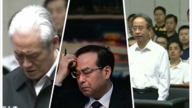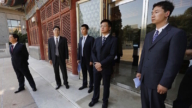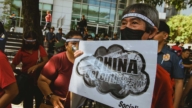【新唐人2012年12月26日讯】在中国网路曝光的一系列腐败案件,显示中国网路日益增强的影响力。中国网民采取发帖、人肉、知情人举报等方式,让贪官无所遁形,全世界叹为观止。但好景不常﹗因为,“网络实名制”将以立法的形式被确认,网民今后在网上发声,必须进行实名登记。部分网友认为,网络实名制立法意在加强舆论监管,以后没有人敢在网络举报贪官了,“网络反腐”可能将告一段落。
中共借着关闭所谓的“低俗”网站、网络谣言等,展开严查网站行动,从上网实名制、到微博实名制等各项制度,纷纷出笼。
24号,中共人大常委会审议《加强网络信息保护的决定草案》,确认“网络实名制”即将立法,中国网民今后在网上发表言论,都必须进行实名登记。
中共喉舌媒体《新华社》披露了草案的部分内容。其中,草案规定﹕网络服务者将对用户实行后台身份管理。
哥伦比亚大学人权研究所访问学者谷川:“目地是威吓网民,让网民感到害怕,不敢去网上发言,因为实质上,他通过这个立法是为了控制网民的,为什么现在着急这个呢﹖是因为前一段时间网络反腐(盛行)。”
十八大后,短短一个月内,由于“网路反腐”挖出的贪官,就有十多人遭到调查和下马,其中最高级别的是中共十八大的中央候补委员、四川省委副书记李春城。12月6号《新华网》报导,据中央纪委有关负责人证实,李春城涉嫌严重违纪,目前正接受组织调查。
网民踊跃举报贪官,而中纪委也信誓旦旦的宣示“有案必查、有腐必反”,当时民众犹如看见黎明前的曙光,在网路上奋力掀起一股网络“反贪潮”。然而对比今天的网路监管立法,才发现原来是“回光返照”。
有网友表示,这不过是为网路封锁找个借口罢了,看看吧,那么多贪污受贿案子都是被网路爆料的,能不恨吗?
大陆网友周先生:“对我自己影响不大,因为我自己就是实名发东西的,我举报,那要派黑社会来暗杀也就来吧,要拿什么法令来,也就来,反正我也是自己不怕的,但是对反腐肯定影响很大,那就是,就是保护贪官。”
而一名北京的网友也向《新唐人》表示,他们上网聊天发讯息又没犯法,完全遵照国家宪法的规定,而且还是国家承诺的“公民有言论自由”。
北京网友:“我觉得在这点上,限制网络与国家宪法相冲突,问题就在这里头,你不讲实话,人家讲实话你就怕,你不能够不反思自己,你真能把国家权力操作透明化吗?”
大陆网路作家荆楚:“这就说明他们对网络的恐慌,说明他们见不得阳光,因为这个政权它与人民的意愿背道而驰,因为宪法第十条,中国人民共和国的一切权利属于人民,那么这句话就承认了主权在民的原则,就(应该)由老百姓的选票来说话。”
据报导,全球最早实行“网络实名制”的是韩国,但这项制度却在今年8月,被韩国法庭裁定为违宪。“首尔大学”调查显示,“实名制”实施五年,网络论坛的平均参与者减少71%,但诽谤跟帖数量从13.9%减少到12.2%,仅减少1.7个百分点,数据显示﹕“实名制”对减少虚假信息的发布帮助不大。
另外,根据美国《华尔街日报》报导,中共网络监管部门也在审议新的规定,将禁止外国企业在中国互联网上发布内容。
采访/陈汉 编辑/黄亿美 后制/郭敬
Network Real-name System Mostly Benefits Corrupt Officials
Recently, on Chinese networks, a series of corruption cases
was exposed, showing the increasing influence of the Internet.
Chinese Internet users have posted, searched, and
used insider reporting to expose corrupt officials.
This has won the worlds’ admiration.
However, good things rarely last long.
”Network Real-name System” (NRS)
will soon become legislation.
This means that netizens voicing their concerns
must register online with their real-names.
Some Internet users believe that the NRS legislation
aims to strengthen the supervision of public opinion.
No one dares to report corrupt officials on the network again.
Thus, the “anti-corruption network" will likely come to an end.
The Chinese Communist Party (CCP) has used an
excuse of closing “vulgar" websites and Internet rumors
and began thorough investigations of websites.
Thus, various systems were suggested, from the Internet
real-name system to microblogging real-name systems.
On Dec. 24, the CCP Standing Committee drafted
a decision to strengthen network information protection.
This confirmed that “NRS” will soon be a legislation.
Chinese netizens, who speak on the Internet,
must register their real-name in the future.
Xinhua News Agency, the CCP’s mouthpiece
media, disclosed part of the contents of the draft.
Among them, the draft stipulates that the network background
service will implement management of user’s identities.
Gu Chuan, visiting Human Rights scholar at Columbia
University: “Its purpose is to intimidate Internet users.
As a result, netizens will be afraid to speak online.
They have to legislate to control Internet users.
Why are they so anxious to do this now? That
is because of recent network anti-corruption cases.”
Due to “network anti-corruption", more than
a dozen corrupt officials have been investigated and dismissed after the 18th Congress.
The officials include Li Chuncheng, a member
of the CCP Central Committee and Deputy Secretary.
On December 6, Xinhua reported that according to the
Central Discipline Inspection Commission confirmed
that Li is currently being investigated for various violations.
Netizens have enthusiastically reported corrupt officials.
The Central Commission for Discipline Inspection
also has vowed to investigate all cases.
People felt that the dawn would be near
and would set off a tide of “anti-corruption.”
However, compared to today’s Internet regulatory
legislation, they find that it was only a short-lived glory.
Net users said that this is an excuse for the Internet blockade.
When it is looked at, so much corruption and bribery cases
are exposed on this network. Shouldn’t they hate us?
Mr. Chou, Mainland Chinese resident:”It does not
affect me too much, because I use my real name.
I”m not afraid of the underworld or any legislatives,
but this legislation offers protection for corrupt officials.”
A Beijing netizen told NTD that chatting or sending
messages on the Internet does not violate the law.
It is in full accordance with the provisions of the national
constitution, which makes a commitment to guarantee that “citizens have freedom of speech".
Beijing netizen: “I think regarding this issue,
limiting the networks violate our constitution.
The problem is that they lie and
are afraid others telling the truth.
Why don’t they reflect on their own
and make state power transparent?”
Jingchu, Mainland Internet writer:
“This explains their panic toward the network.
They cannot be in the sun, because
they are against the will of the people.
Article 10 of the Constitution of the People’s Republic
of China says that, “all rights belong to the people."
That validates the principle of the sovereignty of the
people. Thus, people should speak through their votes.”
According to reports, South Korea is the world’s first country
to introduce “NRS", but this system was ruled unconstitutional in August 2012 by the South Korean court.
A Seoul National University survey showed that over
a period of five years on the “real" real-name system,
there was a decrease of 71% in the average number
of participants in online forums.
However, the number of libel postings only reduced from
13.9% to 12.2%; a decrease of only 1.7 percentage points.
The data shows that it has not offered much
help for the release of false information.
According to the Wall Street Journal, the CCP network
supervision departments are also considering new rules.
These prohibit foreign companies publishing
content on the Internet in China.



























